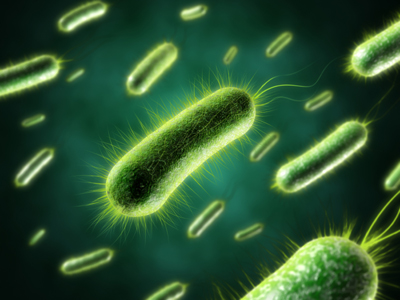
Ask the AI Tutor
Need help with Biology - Superbugs (AQA)? Ask our AI Tutor!
AI Tutor - Lucy
Connecting with Tutor...
Please wait while we establish connection

Superbugs are strains of bacteria which are resistant to antibiotics.
Biology - Superbugs (AQA)
Discover how antibiotic resistance creates "superbugs", why overusing medicines is dangerous, and what science and society can do to keep life-saving drugs working.
1 .
What are antibiotics?
Chemicals that destroy viruses
Chemicals that prevent bacteria from growing or kill them
Hormones that are found naturally in white blood cells
Hormones secreted by white blood cells that stick to antigens
An easy start! Antibiotics are usually specific to certain groups of bacteria
2 .
What is a resistant bacteria?
One that can resist being squashed
One that is not affected by acids
One that is not affected by antibiotics
One that can resist an attack by a bacteriophage virus
The usual example is MRSA
3 .
MRSA is the abbreviation for which of the following?
Methicillin resistant staphylococcus aureus
Microbiologically resistant staphylococcus aureus
Multi resistant staphylococcus aurelius
Microbiologically resistant streptococcus aurelius
MRSA is resistant to the penicillin family of antibiotics (and some others too)
4 .
How do these resistant strains of bacteria arise?
Natural selection
Artificial selection
Selective breeding
Non-selective breeding
Natural selection ensures that only the resistant or most resistant bacteria survive a course of treatment
5 .
What is the least probable outcome when a resistant strain of bacteria develops?
Some diseases could become very difficult to control
The bacteria will grow larger
New types of antibiotic will need to be developed
An epidemic
Resistance in bacteria is nothing to do with how big they are
6 .
What part of the bacteria controls resistance?
Chromosomes
Nucleus
Cytoplasm
Genes
You may have been tempted by the answer chromosomes. Chromosomes are made from genes and certain genes can give a bacteria resistance to certain antibiotics
7 .
Why should you always complete a course of antibiotics?
So that you don't waste the money spent on your prescription
It is illegal not to finish the whole course
It avoids wasting the antibiotics
It kills off the maximum number of bacteria
The antibiotic kills off the least resistant bacteria first and you start to feel well again. If you don't complete the course, the most resistant bacteria could survive. If they escape from your body and infect other people who do the same as you, a completely resistant strain could develop
8 .
Resistance to antibiotics is genetic. Why is this a problem?
Resistance can be passed on to future generations of bacteria
It means that resistant bacteria genes could become part of your genes
You might become immune to the antibiotic
It makes bacteria grow faster
Resistant bacteria will survive a course of antibiotic and therefore be able to reproduce with less competition. As future generations of bacteria inherit this resistance, diseases become more difficult to control
9 .
What are doctors doing to slow down the development of resistant bacteria?
Prescribing more antibiotics
Prescribing longer courses of antibiotics
Prescribing fewer antibiotics
Not prescribing antibiotics
Doctors no longer prescribe antibiotics for minor infections. When your own immune system deals with the bacteria, it does not rely on antibiotics, so both resistant and non-resistant bacteria are destroyed
10 .
Which of the following answers contain the missing words in the correct order?
_________ are one cause of variation in a population of bacteria. A course of ____________ will kill off the non-resistant bacteria leaving ____________ bacteria to multiply. If these escape from the patient it is possible they can _______ others with bacteria that are not killed by antibiotics.
_________ are one cause of variation in a population of bacteria. A course of ____________ will kill off the non-resistant bacteria leaving ____________ bacteria to multiply. If these escape from the patient it is possible they can _______ others with bacteria that are not killed by antibiotics.
Genes, antibodies, resistant, enter.
Antigens, antibiotics, resistant, infect.
Zygotes, cytoplasm, superbug, do
Mutations, antibiotics, resistant, infect.
Exam and test tip: Were you one of the ones who worked out all 4 words first? Hat's off, you are a high flyer! But you don't really need to get all of the missing words. You can narrow it down to two answers by considering just the first word. So when answering questions, especially multiple choice, use techniques like this to make them seem less daunting
**Unlimited Quizzes Await You! 🚀**
Hey there, quiz champ! 🌟 You've already tackled today's free questions.
Ready for more?
Ready for more?
🔓 Unlock UNLIMITED Quizzes and challenge yourself every day. But that's
not all...
not all...
🔥 As a Subscriber you can join our thrilling "Daily Streak" against other
quizzers. Try to win a coveted spot on our Hall of Fame Page.
quizzers. Try to win a coveted spot on our Hall of Fame Page.
Don't miss out! Join us now and keep the fun rolling. 🎉
**Unlimited Quizzes Await You! 🚀**
Hey there, quiz champ! 🌟 You've already tackled today's free questions. Ready for more?
🔓 Unlock UNLIMITED Quizzes and challenge yourself every day. But that's not all...
🔥 As a Subscriber you can join our thrilling "Daily Streak" against other quizzers. Try to win a coveted spot on our Hall of Fame Page.
Don't miss out! Join us now and keep the fun rolling. 🎉






